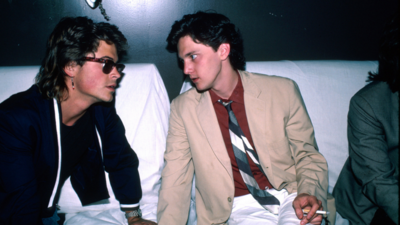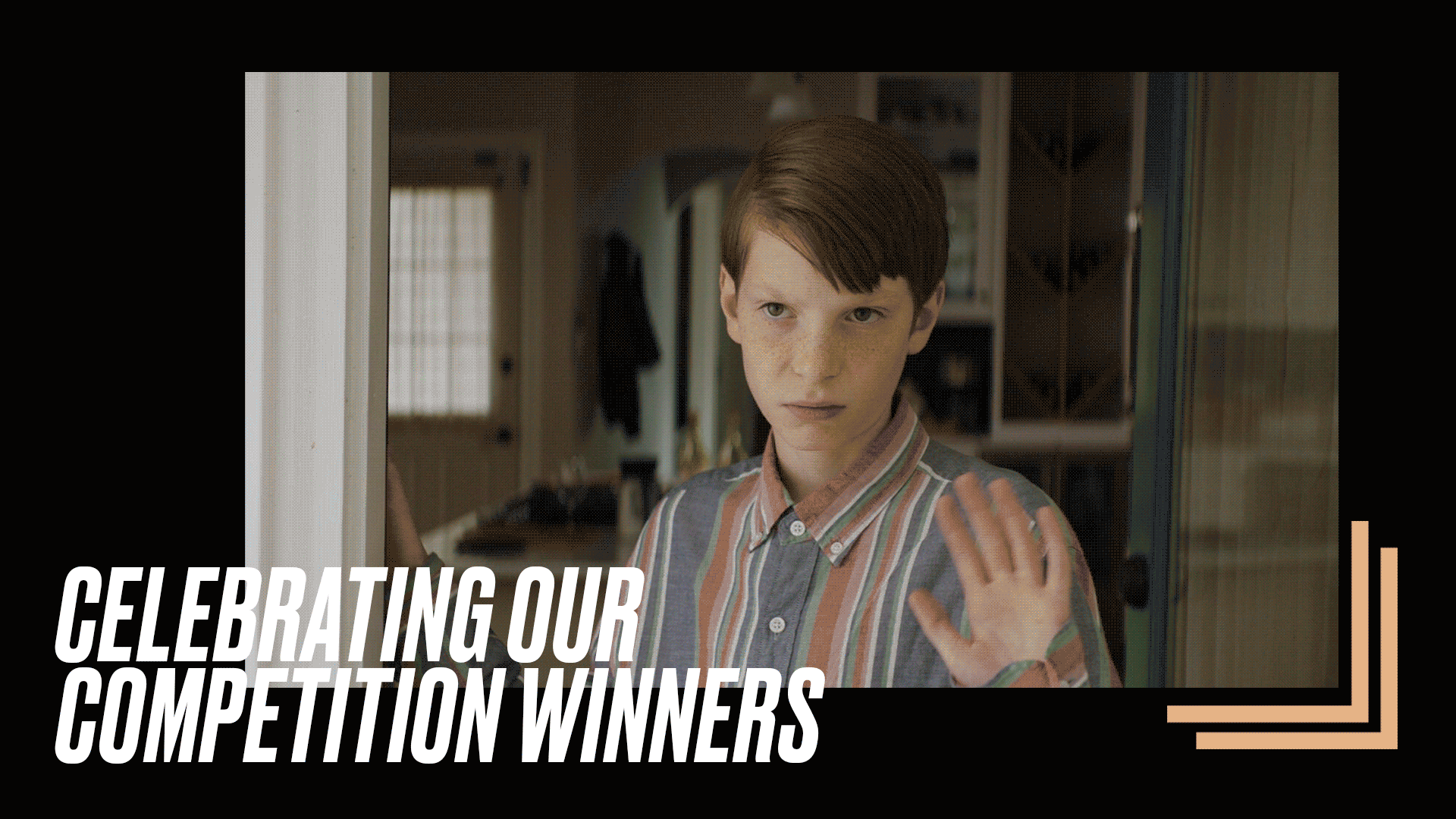
BY EMILY ACKERMAN |
Dish: Cédric Klapisch Serves My Piece of the Pie
A soulless stockbroker, an unemployed mother struggling to feed her kids, the woeful financial crisis, and it's a comedy? The TFF 2011 fave opens this week.

Note: This intervew originally ran as part of our TFF 2011 Face of the Festival series.
The popular French filmmaker behind L'Auberge Espagnole, Russian Dolls and Paris returns with the lively and engaging My Piece of the Pie. This TFF 2011 film, which stars the mesmerizing Karin Viard, opens in NYC on Friday, December 9 at the IFC Center and is available on via IFC nationwide starting today, December 7.

Tribeca: Tell us a little about My Piece of the Pie.
Cédric Klapisch: My Piece of the Pie [Ma Part du Gateau] about the encounter of two people who are very different: one who is a worker in Dunkirk in the north of France, whose factory is closed down due to the economic crisis. She has three kids and she is having money problems, so she is looking for a job and ends up finding work as a cleaning lady for a wealthy stock trader who used to work in London in the financial world and has now returned to France. The characters are from very different social backgrounds, and yet they can get along even though their worlds are keeping them apart. So it’s a comedy that uses this conflict between the two characters.
Tribeca: What inspired you to tell this story as both the writer and director?
Cédric Klapisch: After the financial crisis, the banks solved their problems very quickly and the real problems happened after that. I realized that we were in a period exactly the same as the 1930’s, where the whole world changed because of money problems. In the ‘30s, this created new types of films and literature about social problems, like those of Steinbeck. I felt I had a duty to talk about this subject, whereas in my other films I hadn’t really dealt with political or social issues. This was a big change in society, and I felt I had to speak about it.
Tribeca: You’ve worked in comedy before with L’Auberge Espagnol and Paris. What made you decide to approach this depressing subject matter from a comedic standpoint?
Cédric Klapisch: I think every comedy somehow uses drama or misery. The best example of this is Chaplin, when he did The Kid and Modern Times. Everything he is dealing with is super sad, and yet he can make fun of it. That’s something I like. Capra did the same thing. He would take very sad content and turn it into something playful. This happened in the ‘30s in America; in the ‘60s in Italy, after the war, when Italian comedies made fun of very poor people who had a lot of problems; and English people in the ‘80s. So these filmmakers and time periods were really guides for me on this film. I knew with a dark subject like the economic crisis, I couldn’t be depressing about it myself. The mixture of humor and sadness that I was looking for is not contemporary. It’s not French or American right now.
Tribeca: Karin Viard is fantastic as the main character, France. Had you worked with her before?
Cédric Klapisch: Yes, we worked together on my first feature film, and she was also in my last movie, Paris. (She was the baker.) We know each other very well, and it was really because of that that I wanted to work with her. I felt like I had to do something big with her as she just had small parts in my last two films with her. She has really become a great actress; she made four films this year that are outstanding.
Tribeca: She was hilarious in this film. Did you write the script with her in mind?
Cédric Klapisch: Yes, because she is the only person who could have played this role. She has a talent to channel both sadness and humor. She can go from very sad, emotional scenes to very funny ones, and she can drive you from one to another in an instant.
Tribeca: Did you allow her to improvise at all?
Cédric Klapisch: Only in the great scene where she pretends to be a Russian call girl trying to speak English. I knew that Karin didn’t feel comfortable speaking English herself, so I just told her to say what she knew. I had written a whole dialogue for that scene and I cut all of it and kept what she improvised.
Tribeca: Did she work with you while you were writing the script?
Cédric Klapisch: No, I wrote the script, then sent it to her, and she made lots of comments on it. She is a really good reader and we talked a lot about the coherence of the character and the storyline, but she also wanted to follow what I had in mind and didn’t want to rewrite or change the original text at all.
Tribeca: Without giving too much away, can you talk a little bit about the film’s highly unusual ending?
Cédric Klapisch: That’s what I wanted. We are in a period where movies are more and more predictable, and I think that it’s good for the audience, well for me at least, when you don’t know what’s going to happen in the last 10 minutes. So this film plays with the fact that the audience expects one thing and what occurs is entirely different.
That’s something that I like about Tarantino. You think it’s going to be a very fast action movie and then it slows, and you think a character is nice and suddenly they kill someone. He is aware of what the audience expects and he plays with it, and that’s part of the excitement of his work. I try to do the same thing.
My Piece of the Pie is really about reality, and reality is often more fun and entertaining than fantasy. It’s about the real situation of this trader who is rich and very powerful, and this woman who is poor and submissive, and the real opposition of these two characters. I wanted the ending to be like Nights of Cabiria by Fellini. It’s a story about a prostitute, and in the end it’s really sad, but there is something about it that gives you hope. So it’s not clear whether my film has a happy ending or not, and what’s great about this is that every person has a different opinion about it. These opinions say something about how people view society and what justice means.
Tribeca: What's the craziest thing (or “lightning strikes” moment) that happened during production?
Cédric Klapisch: The ending was pretty crazy, because we were in Dunkirk and I had hundreds of extras who were supposed to be taking a stand for the main character, France, and the jobs they had lost at the factory. The extras were so involved in the story because they were locals who had gone through the same thing as the people in the story. The plant they worked for had closed down, so they had lost their jobs in the last month, so they weren’t acting in a sense. So to film this ending was very moving because they were just reacting to their situation, which was very real.
Tribeca: Did you explain the story to them?
Cédric Klapisch: Yes, and they really understood what it meant. Very often the movie flirts between fiction and documentary. The scenes we shot in the financial buildings in London were real offices and trading floors, and the extras were real brokers who were working during those scenes.
Tribeca: And they were fine with that?
Cédric Klapisch: Yes, in fact, they were so hard at work that they hardly paid attention to us. They were really good extras!
Tribeca: What’s your advice for aspiring filmmakers?
Cédric Klapisch: They should get rid of the frontiers. As I said, films are very formatted at the moment. It’s either a romantic comedy or an action movie, and it has to have the right stars, etc. It’s good to get rid of these conventions, as freedom is the most important think for a filmmaker. I studied film at NYU about 27 years ago, and now what brings quality and depth to my work were my defects from that time. When you start, you have to learn the conventions and the rules, because initially they are helpful, but at some point you need to forget about them. Every director has to find his own rules. Scorsese doesn’t have the same rules as Woody Allen, and everyone has to invent his own language. These directors are well known for their distinct qualities that stray from convention.
Tribeca: What are your hopes for My Piece of the Pie at Tribeca?
Cédric Klapisch: I think the relationship between French and American films has always been different, and it was at its best during the Nouvelle Vague. There was a period about 20 years ago when it was starting to be this way again, but now it’s more complicated. Some films get reviewed here, like Amelie, for instance—every now and then you have a French film that stands out. My hopes are that my film will allow Americans to become more curious about French film, and films from other countries in general. It’s sad that when there is a good movie American people want to remake it in English. I think that shows a lack of curiosity. So my expectations are really that people will see the film and it will reach an American audience.
Tribeca: If you could have dinner with any filmmaker (alive or dead), who would it be?
Cédric Klapisch: I love Scorsese and Woody Allen, and I probably came to New York to study film because of them. In terms of modern directors, I’m currently interested in James Gray, Paul Thomas Anderson, Alan Ball and Alejandro González Iñárritu.
Tribeca: What piece of art (book/film/music/TV show/what-have-you) are you currently recommending to your friends most often?
Cédric Klapisch: I just saw Wim Wender’s Pina, and it’s the first documentary shot in 3D, about choreographer Pina Bausch. I wasn’t really a fan of his last films, but Pina Bausch is one of the most interesting choreographers in dance, which is a very important art form for me. She died a year ago, and the film is so interesting for its mise-en-scene and Pina’s unique story. It hasn’t been released here yet, but watch the trailer, because that alone is amazing.
Tribeca: What would your biopic(s) be called?
Cédric Klapisch: That’s a hard one. I’m eclectic and I like many things and I’m really frightened by the idea of resuming something, so maybe “It’s Hard to Summarize” [laughs.]
Tribeca: What makes My Piece of the Pie a must-see?
Cédric Klapisch: It’s a mixture of fiction, documentary, comedy and drama. The film deals with those four things, and I’m happy, because at our past few screenings I’ve seen that people here are really laughing and responding to it well. I’m glad to make people laugh at a subject that wasn’t previously laughable, because then I think that you get a better understanding of reality and the problems facing today’s society. If you make fun of things then you can help people see reality in a more optimistic light. It can be more effective than a politician’s speech.
My Piece of the Pie opens in NYC on Friday, December 9 at the IFC Center and is available on VOD via IFC nationwide starting today, December 7.
To learn more about My Piece of the Pie, visit the official site.
Watch the trailer:

